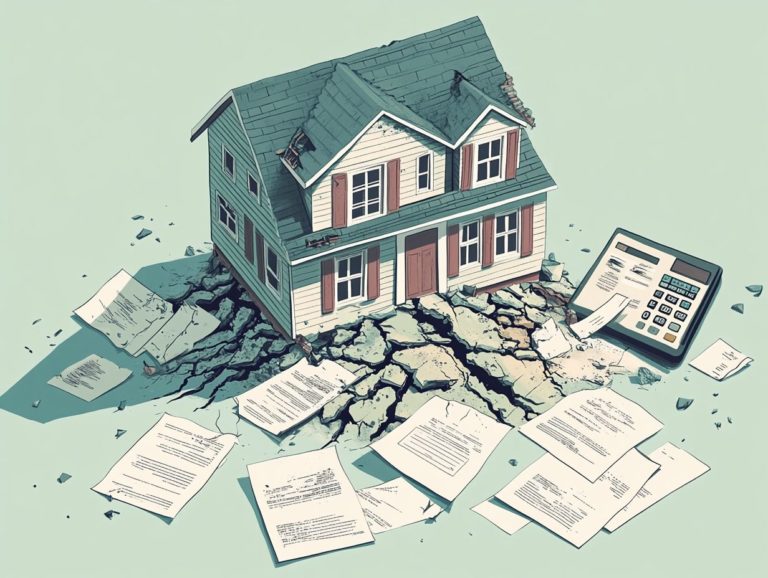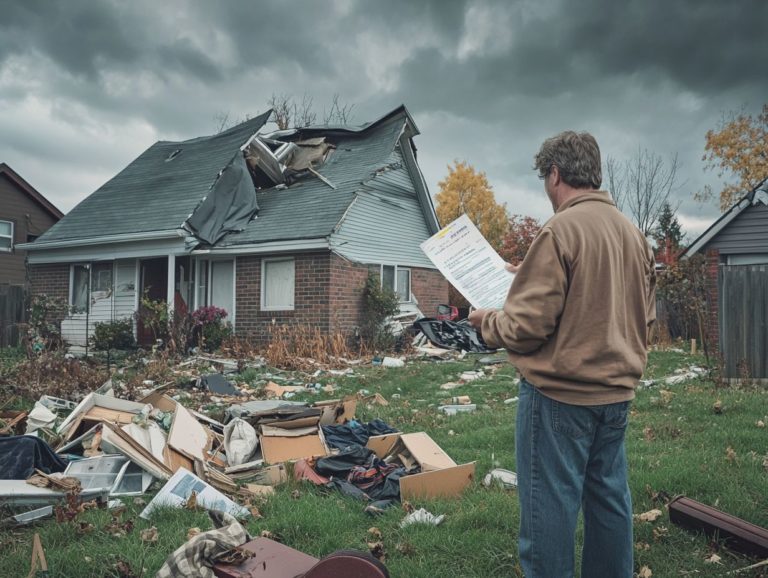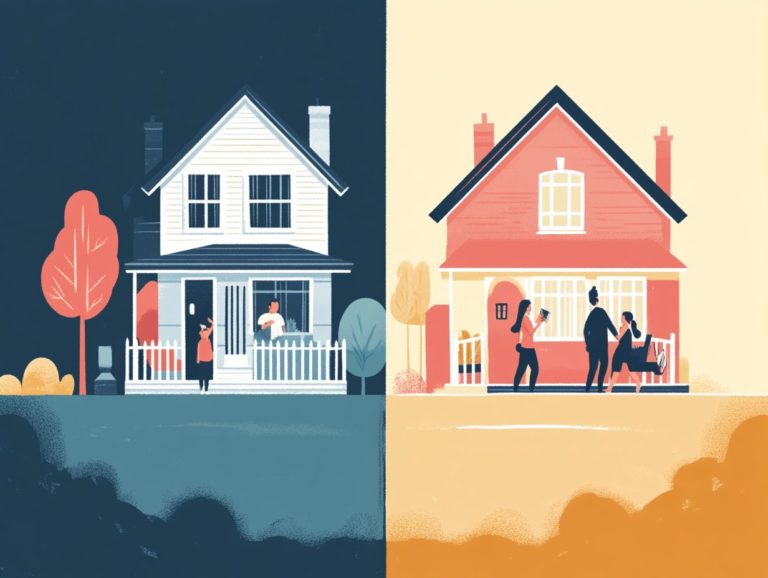Is Home Insurance Required by Law?
Home insurance is an essential safety net for homeowners, providing crucial protection against unforeseen events that could threaten your investment.
So, what exactly is home insurance, and why should it matter to you?
This article delves into the different types of home insurance, ranging from basic coverage to more comprehensive options, while also addressing the legal requirements that vary from state to state.
You ll uncover the substantial benefits of holding a policy, identify key factors to consider when selecting coverage, and receive practical tips on how to navigate the shopping process for the best home insurance options available.
Whether you re a first-time buyer or reevaluating your current policy, grasping the nuances of home insurance is vital for ensuring your peace of mind and securing your financial future.
Contents
- Key Takeaways:
- Understanding Home Insurance
- Types of Home Insurance
- Is Home Insurance Required by Law?
- Benefits of Having Home Insurance
- Factors to Consider When Choosing Home Insurance
- How to Get Home Insurance
- Frequently Asked Questions
- Is Home Insurance Required by Law?
- What are the consequences of not having home insurance?
- Are there any situations where home insurance is legally required?
- Can I choose not to have home insurance if I fully own my home?
- What types of coverage are typically included in home insurance?
- Are there any penalties for not having home insurance?
Key Takeaways:
Here s what you need to know about home insurance:
- Home insurance provides financial protection and peace of mind against unexpected events like natural disasters or theft.
- While home insurance isn t required by federal law, some states and localities may have their own requirements.
- When choosing home insurance, consider factors like cost, coverage, and deductible (the amount you pay out of pocket before insurance kicks in).
- Shop around for quotes and compare policies to find the best coverage for your needs.

Understanding Home Insurance
As a homeowner, understanding home insurance is crucial for protecting your finances against the risks tied to property ownership. This insurance can cover many risks such as property damage, personal liability, and extra living expenses that may arise from unforeseen events like natural disasters or accidents.
Mortgage lenders often require homeowners insurance to ensure that their investment is shielded from significant losses. Many policies come equipped with features such as flood and earthquake coverage, which are vital if you live in areas susceptible to these hazards.
Homeowners associations (HOAs) may have specific insurance requirements to protect communal property.
What is Home Insurance?
Home insurance, or homeowners insurance, is essentially a contract you enter with an insurance company that offers you financial protection against risks like property damage and personal liability claims.
This type of insurance typically covers a broad spectrum of potential hazards think fire, theft, vandalism, and certain weather-related events, such as hurricanes or floods, all depending on the specifics of your policy.
A standard homeowners policy also includes liability protection, which can cover medical expenses or legal fees if someone gets injured on your property.
A reliable insurance policy is your safety net, shielding you and your family from unexpected financial burdens that can arise from damage or accidents. Ultimately, this protection provides you with peace of mind, knowing you re prepared for whatever life throws your way.
Types of Home Insurance
When contemplating home insurance, it is crucial for you to grasp the various types of coverage available. This includes both basic coverage and comprehensive coverage, each carefully designed to meet the unique requirements of homeowners like yourself.
Basic Coverage vs. Comprehensive Coverage
Basic coverage in homeowners insurance generally provides protection against common perils like fire, theft, and vandalism. In contrast, opting for comprehensive coverage opens the door to a wider array of protections, including natural disasters.
Comprehensive coverage addresses severe incidents such as floods and earthquakes while also offering personal liability protection. This safeguard shields you from financial loss due to lawsuits arising from injuries or damages occurring on your property. For example, if a visitor slips and falls unexpectedly, having this level of coverage can significantly alleviate the financial burden.
Property damage coverage helps manage costs for repairs or replacements for structural damage and personal belongings. The implications for homeowners are substantial; comprehensive coverage can provide greater peace of mind and financial security in the face of unexpected events that could otherwise lead to significant out-of-pocket expenses.
Is Home Insurance Required by Law?

Home insurance isn’t required by law. However, many mortgage lenders mandate it to protect their investment, so it’s important to understand the requirements for home insurance coverage.
They typically outline specific homeowners insurance requirements that you must fulfill before securing a loan.
State and Local Requirements
State and local requirements for homeowners insurance can vary significantly. This variability can impact the type of coverage you may need to secure.
These differences come from various rules about minimum coverage levels, specific policy inclusions, and even the availability of protection against natural disasters like floods or earthquakes.
For homeowners in coastal areas, you might need extra flood insurance. In wildfire-prone regions, comprehensive fire coverage may be required.
Understanding these localized laws is essential. Compliance not only protects you from potential penalties but also ensures you have adequate financial safeguards in place.
Ultimately, effectively navigating this intricate landscape allows you to make informed decisions about your insurance needs. This ensures peace of mind in an ever-changing environment.
Benefits of Having Home Insurance
Having home insurance provides you with a wealth of advantages. Chief among them is financial protection against property damage and personal liability.
This security allows homeowners like you to enjoy peace of mind in even the most uncertain situations.
Financial Protection and Peace of Mind
The financial protection provided by homeowners insurance is truly invaluable. It safeguards you against costly property damage and potential personal liability claims.
In the unfortunate event of natural disasters like hurricanes, wildfires, or floods, having robust coverage can help mitigate the financial burden of repairs and replacements.
Consider this: around 40% of small businesses never reopen following a disaster, mainly due to inadequate insurance.
If an accident occurs on your property that leads to injuries, you may face hefty medical bills or legal fees. This adds layers of emotional stress to an already challenging situation.
You ll feel a huge relief knowing you re covered in these situations! Homeowners insurance not only protects your assets but also cultivates a sense of security, underscoring the crucial importance of being prepared for life s unpredictable twists and turns.
Factors to Consider When Choosing Home Insurance
When selecting home insurance, you must weigh several factors, including cost, coverage options, and deductible amounts. This will help you identify the policy that best suits your needs.
Taking the time to evaluate these elements will help you secure the most appropriate protection for your home.
Cost, Coverage, and Deductible

The cost of home insurance depends on several factors. These include the level of coverage you choose, the deductible you set, and the current homeowners insurance rates in your area.
As you assess these elements, it s essential to grasp how they interconnect. For example, if you opt for higher coverage limits, your premiums are likely to increase, as the insurer is taking on more risk.
On the flip side, choosing a lower deductible might mean higher monthly payments, but it also offers greater financial protection when claims come into play.
Local rates can vary based on regional risks, such as the likelihood of natural disasters or crime rates. These can influence overall affordability.
Therefore, it s vital to evaluate your specific needs and risk tolerance carefully. By balancing these factors, you can select the most suitable home insurance policy that aligns with your budget while still providing the protection you need.
How to Get Home Insurance
Securing home insurance requires a thoughtful and methodical approach. You’ll want to shop around for quotes and compare policies from various insurance professionals.
This way, you can identify the best coverage that aligns perfectly with your specific needs.
Shopping for Quotes and Comparing Policies
Shopping for quotes and comparing home insurance policies is a crucial step in securing the most suitable coverage for your needs.
Begin by gathering multiple quotes from various insurance providers. Each will present slightly different terms and premium amounts. Pay close attention to key coverage areas such as:
- Dwelling protection
- Personal property coverage
- Liability limits
- Additional living expenses in the event of home damage
As you examine these policies, assess any exclusions or deductibles this is the amount you pay out of pocket before insurance kicks in. Talking to insurance agents can offer invaluable insights. They re well-versed in the nuances of these policies and can help you make informed decisions that align with your financial situation and potential risks.
Watch this video to learn more about choosing the right home insurance.
Frequently Asked Questions
Is Home Insurance Required by Law?
No, home insurance is not required by law. However, it is strongly recommended for homeowners to protect their assets and finances from unexpected events.
What are the consequences of not having home insurance?

If you do not have home insurance, you will be responsible for covering the full cost of damages or losses to your home and belongings.
Are there any situations where home insurance is legally required?
Yes, a lender may require you to have home insurance before approving a mortgage loan. Some states may have laws that require certain types of home insurance, such as flood insurance in high-risk areas.
Can I choose not to have home insurance if I fully own my home?
Yes, if you own your home outright, you are not legally obligated to have home insurance. However, it is still recommended to protect your investment.
What types of coverage are typically included in home insurance?
Home insurance typically includes coverage for property damage, personal liability, and additional living expenses. Coverage may vary depending on the insurance provider and specific policy.
Are there any penalties for not having home insurance?
There are no direct penalties for not having home insurance, but you may face significant financial consequences if you experience damage or loss to your home without coverage.
Don’t risk it! Start comparing quotes today to find the best coverage for your home!





